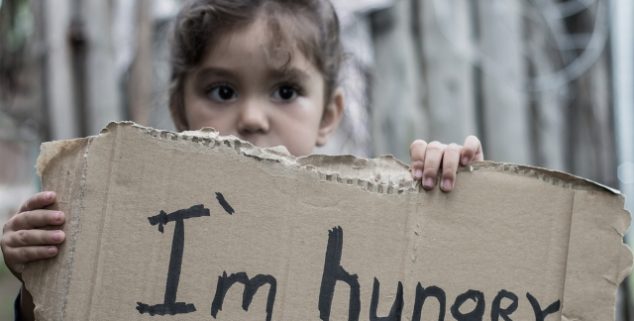Opinion
Hunger and the ‘public charge’ rule
 A 3-year-old child with a cardboard sign. (Photo: Discha-AS, via Shutterstock)
A 3-year-old child with a cardboard sign. (Photo: Discha-AS, via Shutterstock)Blanca was seven months pregnant when her husband’s sciatica rendered him unable to work. The pain in his back was so intense he couldn’t stand upright. They had no medical insurance and could not qualify for unemployment or disability. For months they survived off savings until there was nothing left. Their food budget dwindled to $2, “maybe $3, or sometimes nothing at all,” Blanca said. This is when she decided to apply for CalFresh.
“I no longer wanted to give my daughter $1 juice diluted with water,” Blanca remembers.
CalFresh made a huge difference for Blanca’s family. “Our mood improved enormously since we had food on the table,” she said, “CalFresh kept my family afloat and stable during those difficult times.”
Like housing and health care, food is fundamental.
When jobs pay too little, public programs can close the gap. Yet, the Trump administration is proposing a ‘public charge’ rule that would make it difficult for immigrants to get a green card or immigration visa if they have received public assistance through CalFresh (known as SNAP nationally), housing assistance, or Medi-Cal, all of which help families cover costly, but essential needs. This provides a pathway out of poverty. In 2015, CalFresh alone lifted 800,000 Californians out of poverty— nearly half were children.
This policy is a racist and classist attack against hardworking families with lower wages.
Like housing and health care, food is fundamental. When people can afford nutritious food they are healthier and better prepared to develop the skills necessary to get higher paying jobs. A study of early Food Stamp Program participants found that adults who participated as young children reported better health, and had lower rates of obesity, high blood pressure, heart disease, and diabetes.[1]Women who grew up with Food Stamps reported improved economic self-sufficiency; research shows they were more likely to graduate high school, be employed, have higher earnings, and were less likely to utilize public assistance programs.
While the ‘public charge’ rule would apply to a relatively small number of people, the fear it creates will discourage millions from accessing the programs. A recent study, which surveyed more than 35,000 mothers across the U.S., found that SNAP participation for recent immigrant householdsdropped by nearly 10% in the first half of 2018. This is in line with what food banks and health clinics across California have observed, that Trump’s anti-immigrant rhetoric is generating fear of government programs.
If the proposed ‘public charge’ rule takes effect, the UCLA Center for Health Policy Research estimates that hundreds of thousands of Californians would disenroll from CalFresh, making it harder for families to afford food and triggering devastating effects on local economies. Disenrollment of this scale could result in up to $2.8 billion in lost economic outputannually across the state, and as many as 17,700 lost jobs.
Immigrants are our friends, family members and neighbors. Half of all California children have at least one immigrant parent, and more than a third of working-age adults are immigrants.When they can put food on the table, a roof over their head, and tend to their medical needs—things are better for all of us.
If this exclusionary policy is enacted, “there will be more poor families and more children with hunger in their empty bellies,” said Blanca; adding, “how many more mothers must buy the cheapest juice to dilute it with water to make it last for their children, like I once did?”
We all have the power to fight back against this cruel attack – but there is only a small window of time remaining to act. The rule is posted for public comment until December 10th. The national Protecting Immigrant Families coalition has the goal of submitting 100,000 comments opposing the proposed changes. Make your voice heard today.
—
Editor’s Note: Rob Bonta, D-Alameda, is a member of the California Assembly. Gabrielle Tilley is an advocate with California Food Policy Advocates.
Want to see more stories like this? Sign up for The Roundup, the free daily newsletter about California politics from the editors of Capitol Weekly. Stay up to date on the news you need to know.
Sign up below, then look for a confirmation email in your inbox.

Leave a Reply